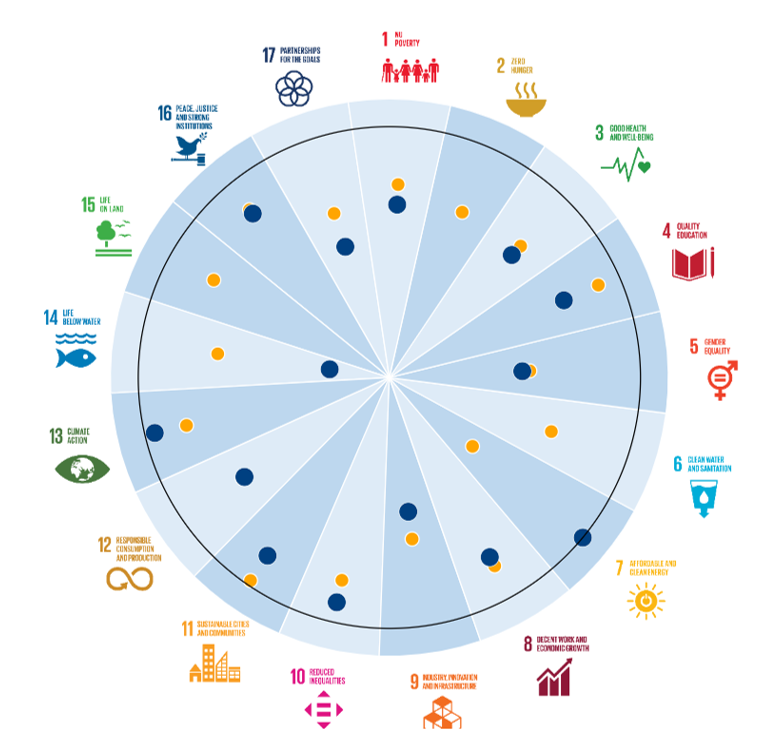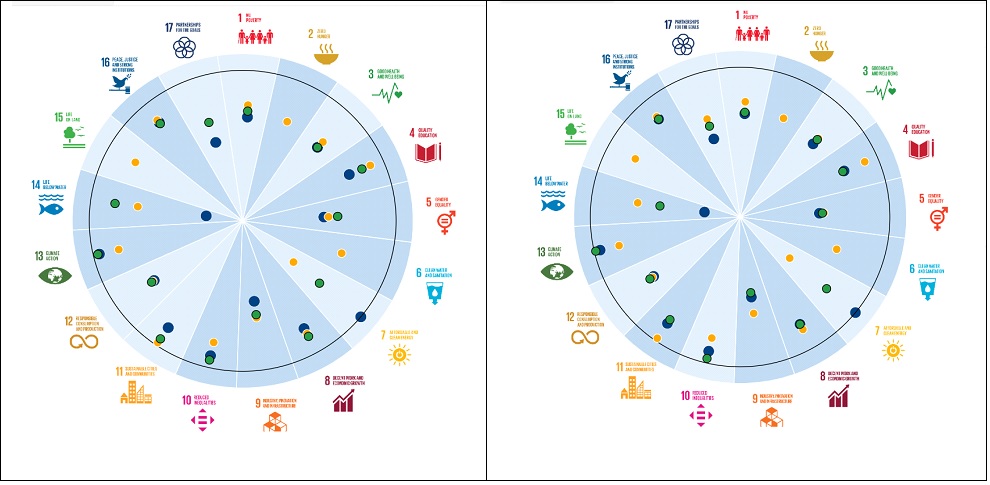 In this blog, Professor Raquel Ortega-Argilés discusses the 17 Sustainable Development Goals (SDGs) introduced by the United Nations in their 2030 Agenda. How the UK and the West Midlands is performing in comparison to other regions, and what impact COVID-19 will have on meeting these goals.
In this blog, Professor Raquel Ortega-Argilés discusses the 17 Sustainable Development Goals (SDGs) introduced by the United Nations in their 2030 Agenda. How the UK and the West Midlands is performing in comparison to other regions, and what impact COVID-19 will have on meeting these goals.
In September 2015, the General Assembly of the United Nations adopted the 2030 Agenda for Sustainable Development that includes 17 Sustainable Development Goals (SDGs). Building on the principle of “leaving no one behind”, the new Agenda emphasises a holistic approach to achieving sustainable development for all on all fronts – social, economic and environmental. The Agenda established the commitment that over the coming years, governments and organisations will redouble their development efforts to create a better future for the planet, ensuring prosperity, inclusivity and sustainability for all.
To analyse the UK regions’ disparities in their progress towards the SDG’s goals and targets, we use the OECD methodology (OECD, 2019). Based on the UN Global List of 244 indicators (United Nations, 2017), this methodology evaluates the distance that OECD countries need to travel to meet SDG targets for which data is currently available. The 17 development goals are grouped into five main groups: people, planet, prosperity, peace and partnership.
The first group “people” includes five SDGs: (1) End poverty in all its forms everywhere; (2) End hunger, achieve food security and improved nutrition and promote sustainable agriculture; (3) Ensure healthy lives and promote well-being for all at all ages; (4) Ensure inclusive and equitable quality education and promote lifelong learning opportunities for all; (5) Achieve gender equality and empower all women and girls.
The second group “planet” includes: (6) Ensuring availability and sustainable management of water and sanitation for all; (12) Ensuring sustainable consumption and production patterns; (13) Take urgent action to combat climate change and its impacts; (14) Conserve and sustainably use the oceans, seas and marine resources for sustainable development; and (15) Protect, restore and promote sustainable use of terrestrial ecosystems, sustainably manage forests, combat desertification, and halt and reverse land degradation and halt biodiversity loss.
The third group “prosperity” includes: (7) Ensure access to affordable, reliable, sustainable and modern energy for all; (8) Promote sustained, inclusive and sustainable economic growth, full and productive employment and decent work for all; (9) Build resilient infrastructure, promote inclusive and sustainable industrialisation and foster innovation; (10) Reduce inequality within and among countries; and, (11) Make cities and human settlements inclusive, safe, resilient and sustainable.
The fourth group “peace” focuses on (16) Promoting peaceful and inclusive societies for sustainable development, provide access to justice for all and build effective, accountable and inclusive institutions at all levels.
The last group “partnership” is centred on (17) Strengthening the means of implementation and revitalise the global partnership for sustainable development.
Some of these goals are mainly defined to ensure higher levels of development in the most deprived areas of the world. The holistic or systemic approach of the Agenda illustrates how intertwined the pillars of development are.
Based on 127 available indicators allowing coverage of 102 of the 169 SDG targets, the United Kingdom has currently achieved 17 of the 2030 targets, and many of the remaining distances to targets are relatively small compared with other OECD countries (Figure 2.69 in OECD, 2019). Relative to the OECD, the UK reports a relatively low death rate from traffic accidents (target 3.6), a high participation rate in organised learning (target 4.2) and has achieved target 17.2 on official development assistance. However, the report also indicates that some challenges remain; the UK is still very far (i.e. more than 3 standardised distances away) from meeting 2% of the targets. Among them, for instance, obesity rates are still very high (target 2.2), tobacco consumption is of concern (target 3.a) and policies and practices against illegal, unreported and unregulated fishing could be improved, notably in international co-operation and engagement in cross-country initiatives (target 14.4) (OECD, 2019).
In the figure below, we compare the UK regional average and the West Midlands region. The closer to the centre, the further away from the SDG target the region is. The West Midlands scores are in blue and the UK scores are in yellow. Concerning the UK regional average, the areas that need more attention are (5) Gender equality and (7) Affordable and clean energy while the UK average seems to score relatively well in the goals (4) Quality Education; (8) Decent work and economic growth; (10) Reduced inequalities; (11) Sustainable cities and communities; (13) Climate action; (15) Life on land; and (16) Peace, justice and strong institutions.
The West Midlands region scores lower on various goals compared to the UK average. The areas that require more attention are (5) Gender equality, (9) Industry, innovation and infrastructure, (14) Life below water and (17) Partnerships for the goals. The region scores higher than the UK average on the goals (7) Affordable, and clean energy; (10) Reduced inequalities and (13) Climate action.

In the figure below, we compare the West Midlands region with the capital region (Greater London) and the UK country average. Greater London (in green) reports higher values than the UK average and West Midlands (in blue) in many different SDGs. West Midlands is closer to the SDG targets (7) Affordable, and clean energy; (10) Reduced inequalities and (13) Climate action.

In the figure below, when comparing the regions West Midlands (blue) and East Midlands (green), we can observe that they score relatively similarly in many different targets (3, 5, 8, 9, 10, 11, 12, 14 and 16). East Midlands scores better in (1) No poverty, (4) Quality education and (17) partnership for the goals. At the same time, there is a big difference in their scores in the goals (7) Affordable and clean energy and (13) Climate action.

Finally, the last figures on this piece, Figures 4a and 4b, compare West Midlands region (blue) with the Northern regions (green) and the UK country average (yellow), respectively. The West Midlands region only out-performs other areas on (7) Affordable and clean energy.
Comparing the North West with the North East regions, we can see that they score similarly in areas such as (1) No poverty (below the UK average); (3) Good health and well-being or (12) Responsible consumption and production and (13) Climate action. In comparison, they diverge in areas such as (4) Quality Education with a higher score in the North East or (14) with higher a higher score in the North West.

How does COVID-19 make it more challenging for places in reaching the SDGs and targets?
COVID-19 is having significant direct impacts in the SDG on health and well-being. Nevertheless, it also has significant effects on other SDGs connected with “people”, “prosperity” or “partnerships”. Areas related to poverty or education are directly influenced by COVID-19 as it affects decent work and economic growth and inequalities, but also other areas such as responsible consumption and production or sustainable cities and communities have been affected.
The economic effects of COVID-19 are uneven in space with more deprived areas, coastal and urban areas being the most affected (Florida et al., 2020; McCurdy, 2020; Nathan, 2020). The UK’s most deprived towns and cities, some of which are also reliant on tourism are amongst the areas hit hardest by the crisis (McCurdy, 2020), but also areas that are heavily dependent on trade have suffered as the value chains have been wholly affected (Carrascal-Incera, 2020).
The different effects of Covid-19 on sectors and activities (Carrascal-Incera, 2020; Dingel and Neiman, 2020; Kumar and Haydon, 2020) has also had different societal effects. Younger workers, female workers, low-skilled workers and poorer households appear to be the segments of the population that are more adversely affected.
During the last months, the United Nations have expressed its concerns on the challenges that Covid-19 may impose in achieving the “roadmap for humanity” set in the Sustainable Development goals and targets. The UNDP estimates that global human development—a combination of education, health, and living standards—could fall this year for the first time since 1990 when measurements began due to the consequences of the pandemic. The digital divide, health accessibility, work security and social protection imbalances have been exposed and are being re-evaluated to ensure development that brings inclusivity, sustainability and prosperity to all communities and places.
References
Carrascal-Incera, A. (2020) Economic Exposure to COVID-19 (Part I): The Situation in the West Midlands Region – Closing the Borders, City-REDI Blog.
Dingel, J.I. and Neiman, B. (2020). “How many jobs can be done at home?,” Journal of Public Economics, vol 189.
Doerr, S. and Gambacorta, L. (2020) Covid-19 and Regional Employment in Europe, BIS Bulleting num. 16, May.
Florida, R; Glaeser, E.; Sharif, M.M.; Bedi, K.; Campanella, T.J.; Heng Chee, C.; Doctoroff, D.; Katz, B; Katz, R.; Kotkin, J.; Muggah, R., Sadik-Khan, J. (2020) How Life in Our Cities Will Look After the Coronavirus Pandemic, Foreign Policy, May 1.
Kumar, N. and Haydon, D. (2020) Industries Most and Least Impacted by Covid-19 from a probability of default perspective, S&P Global, March Update
McCurdy, C. (2020) Local differences. Responding to the local economic impact of Coronavirus, Resolution Foundation, June 14
Nathan, M (2020) The city and the virus, Medium, May 14
OECD (2019) Measuring Distance to the SDG Targets 2019. An Assessment of Where OECD Countries Stand. OECD Publisher, Paris.
United Nations (2017) Global indicator framework for the Sustainable Development Goals and targets of the 2030 Agenda for Sustainable Development, United Nations.
This blog was written by Professor Raquel Ortega-Argiles, Professor of Regional Economic Development, City-REDI / West Midlands REDI, the University of Birmingham.
Disclaimer:
The opinions presented here belong to the author rather than the University of Birmingham.
To sign up for our blog mailing list, please click here.
